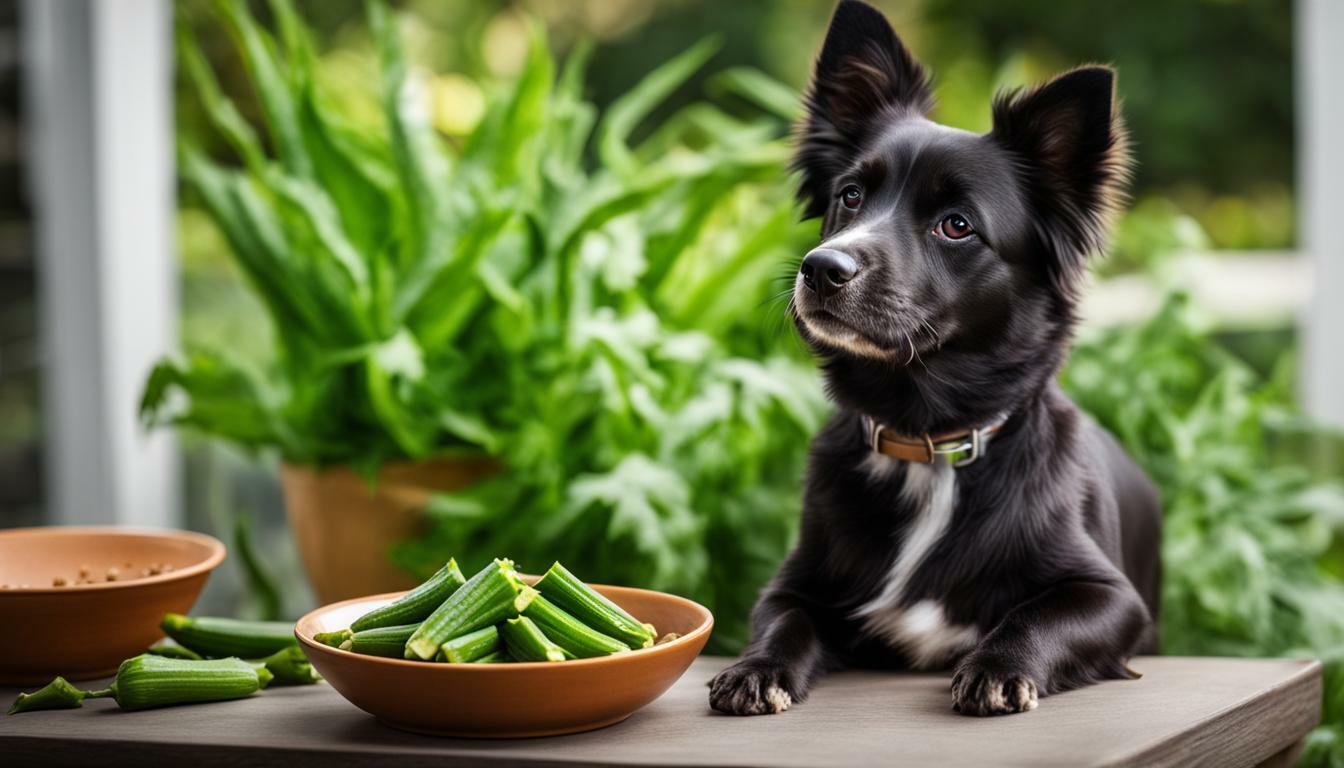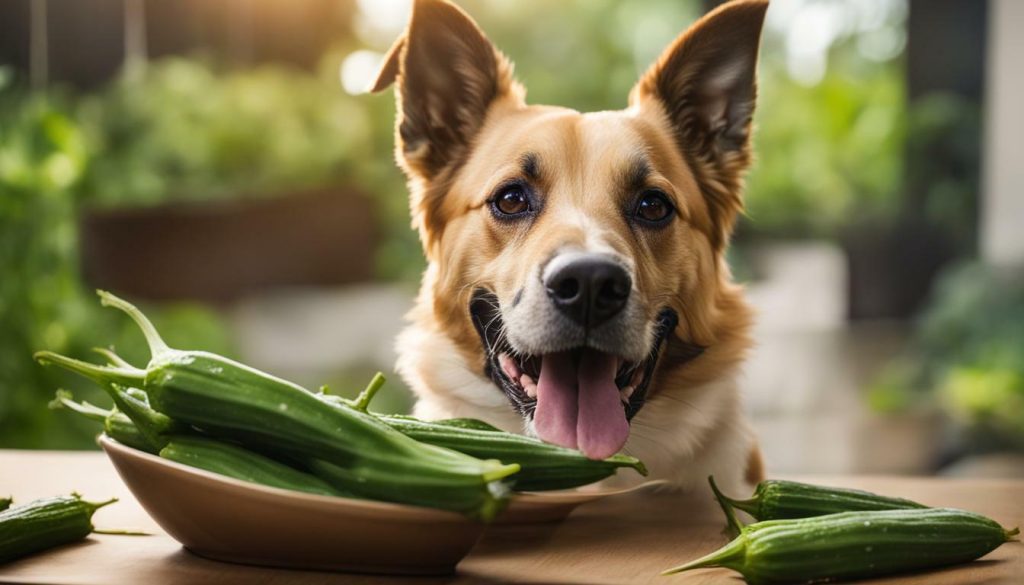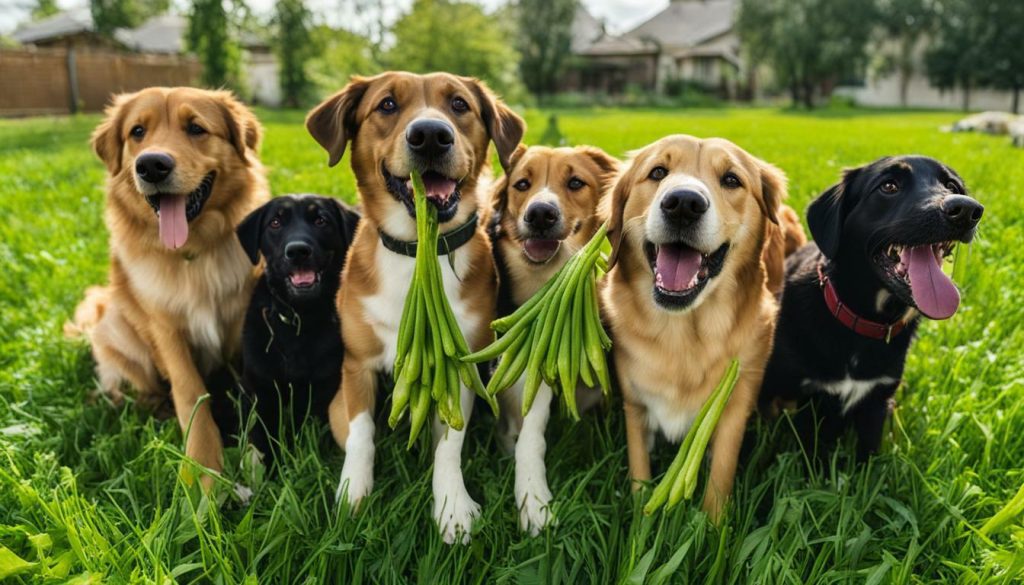
Many dog owners wonder if it’s safe to feed their furry friends okra and if this vegetable offers any health benefits. Well, I’m here to provide you with the answers you’re looking for. Okra is actually safe for dogs to eat in moderation and it can even provide them with a range of nutritional benefits. Let’s explore the details!
Key Takeaways:
- Okra is safe for dogs to eat in moderation.
- It is a nutritious vegetable that is high in fiber, vitamins, and minerals.
- Plain, cooked okra without added fats or salt is recommended for dogs.
- Consulting a veterinarian before introducing new foods to a dog’s diet is important.
- There are potential risks to consider, such as choking hazards, allergies, and digestive issues.
Okra’s Nutritional Value for Dogs
Okra is a nutritious vegetable that can provide various health benefits to dogs. It is high in fiber, which aids in digestion and promotes regular bowel movements. The fiber in okra can also help regulate blood sugar levels in dogs, making it a suitable addition to their diet. Additionally, okra is packed with essential vitamins and minerals, including vitamin C, vitamin K, folate, and potassium. These nutrients contribute to a dog’s overall well-being and support their immune system.
One of the key benefits of okra for canine nutrition is its low calorie content. This makes it an excellent choice for dogs that need to manage their weight or maintain a healthy weight. As a natural dog food supplement, okra can be included in their regular meals or used as a healthy treat. Just be sure to serve plain, cooked okra without any added fats or salt, as these can be harmful to dogs.
To illustrate the nutritional value of okra for dogs, refer to the table below:
| Nutrient | Amount per 100g of Okra |
|---|---|
| Fiber | 3.2g |
| Vitamin C | 23mg |
| Vitamin K | 31.3mcg |
| Folate | 60mcg |
| Potassium | 299mg |
It’s important to note that while okra is safe for dogs to consume, moderation is key. Feeding excessive amounts of okra can lead to digestive issues due to its high fiber content. It’s always best to consult with a veterinarian before introducing new foods to your dog’s diet, including okra. They can provide tailored advice based on your dog’s specific needs and ensure their overall health and well-being.

Guidelines for Feeding Okra to Dogs
When feeding okra to your dog, it’s important to follow certain guidelines for their safety and to maximize the benefits. Okra is safe for dogs to eat in moderation, but it’s crucial to serve it plain and cooked without any added fats or salt. This ensures that your furry friend receives the nutritious benefits of okra without any potential harmful additives. Additionally, it’s recommended to consult a veterinarian before introducing new foods to a dog’s diet to ensure it aligns with their specific nutritional needs.
When preparing okra for your dog, make sure to properly wash it to remove any dirt, pesticides, or bacteria that may be present. This ensures that your dog’s meal is clean and safe to consume. It’s also important to consider the size of the okra pieces you’re serving to your dog. Cutting the okra into smaller, manageable pieces can help prevent choking hazards and make it easier for your dog to eat.
While okra is generally safe for dogs, it’s essential to monitor your dog for any signs of allergies or digestive issues. If you notice any adverse reactions such as vomiting or diarrhea after feeding okra, it’s best to discontinue its use and consult your veterinarian for further guidance. Every dog is unique, and what may be safe for one dog may not be suitable for another.
| Alternative Vegetables for Dogs: |
|---|
| Carrots |
| Cucumbers |
| Celery |
| Green Beans |
In conclusion, okra can be a nutritious addition to your dog’s diet when fed in moderation and according to the guidelines mentioned above. However, it’s always best to consult with a veterinarian before making any significant changes to your dog’s diet. By doing so, you can ensure that your furry friend receives the best possible care and nutrition that suits their individual needs.

Potential Risks and Considerations
While okra is generally safe for dogs, there are important risks and considerations to be aware of. One potential risk is the choking hazard that okra presents, especially if given to dogs in large chunks or without being properly cooked. To prevent this, it’s crucial to cut okra into small, manageable pieces or steam it until it is soft and easily chewable for your furry friend.
Another consideration is the potential for allergies. Although rare, some dogs may have an allergic reaction to okra. To determine if your dog is allergic to okra, start by feeding them a small amount and carefully observing their response. Look out for signs of itching, swelling, or digestive issues. If any of these symptoms occur, it’s best to avoid feeding okra to your dog and consult a veterinarian for alternative vegetable options.
Moreover, the high fiber content in okra can lead to digestive issues if overfed to dogs. Too much fiber can cause diarrhea, gas, or bloating. It’s important to introduce okra gradually into your dog’s diet, starting with small portions and monitoring their digestion. Additionally, always serve dogs plain, cooked okra without any added fats or salt, as these can be detrimental to their health.
| Vegetable | Serving Size | Benefits |
|---|---|---|
| Carrots | Sliced or grated | Rich in vitamins A and C, promotes dental health |
| Cucumbers | Sliced | Hydrating, low in calories, provides vitamins K and C |
| Celery | Sliced or diced | High in fiber, antioxidants, and vitamins A and C |
| Green beans | Steamed or boiled | Low in calories, good source of fiber and vitamins C and K |
Remember, every dog is unique, and their dietary needs may vary. It’s always recommended to consult a veterinarian before introducing new foods to your dog’s diet. A professional can provide personalized advice based on your dog’s specific health conditions, age, and breed, ensuring they receive a balanced and nutritious diet.

Seeking Professional Advice
To ensure the best diet for your dog’s specific needs, it’s crucial to consult a veterinarian who can provide personalized guidance and recommendations. They can assess your dog’s overall health, age, breed, and any specific dietary requirements or restrictions they may have. A veterinarian will be able to advise you on whether okra is a suitable addition to your dog’s diet and how much should be given.
When consulting a veterinarian, it’s important to share any concerns or questions you may have about feeding okra to your dog. They will be able to provide insight into potential risks or considerations specific to your dog’s health. Additionally, they may recommend alternative vegetables that can provide similar nutritional benefits to okra.
Benefits of Professional Guidance
- A veterinarian can provide accurate information on the nutritional value of okra and how it can contribute to your dog’s overall health and well-being.
- They can help you determine the appropriate serving size of okra for your dog based on their size, weight, and activity level.
- Veterinarians can identify any potential allergies or digestive issues your dog may have that could be exacerbated by consuming okra.
- They can guide you on how to properly prepare okra for your dog, such as cooking it without added fats or salt.
Remember, a veterinarian’s expertise is invaluable when it comes to making informed decisions about your dog’s diet. By seeking their professional advice, you can ensure that you are providing your furry friend with the best possible nutrition for their specific needs.

Conclusion
In conclusion, okra can be safely fed to dogs in moderation, but it’s essential to consider potential risks and consult a veterinarian for guidance on your dog’s specific dietary needs.
Okra is a nutritious vegetable that can provide various health benefits to dogs. It is high in fiber, vitamins, and minerals, making it a valuable addition to their diet. However, due to its high fiber content, it’s important not to overfeed okra to dogs as excessive fiber intake can lead to digestive issues.
When serving okra to dogs, it should be plain and cooked. Avoid adding fats or salt, as these can be harmful to your furry friend. Additionally, make sure to wash the okra thoroughly to remove any dirt, pesticides, or bacteria that may be present.
While okra is generally safe for dogs, there are some risks to consider. Choking hazards can occur if the okra is not cut into small, manageable pieces. Some dogs may also have allergies or sensitivities to okra, so it’s important to observe their reaction after consuming it. If any adverse symptoms occur, such as vomiting or diarrhea, discontinue feeding okra and consult a veterinarian.
It’s worth noting that there are alternative vegetables that can be fed to dogs if you prefer not to give them okra. Carrots, cucumbers, celery, and green beans are all safe and nutritious options that can be included in your dog’s diet.
Remember, every dog is unique, and their dietary needs may vary. To ensure your dog receives the best nutrition possible, it’s always recommended to consult a veterinarian before introducing any new foods to their diet. They can provide personalized advice and guidance tailored to your dog’s specific needs.
FAQ
Can dogs eat okra?
Yes, dogs can eat okra in moderation. It is safe for them to consume and can provide various health benefits.
Is okra safe for dogs?
Okra is safe for dogs when served plain and cooked, without added fats or salt. However, it’s important not to overfeed it due to its high fiber content.
What are the nutritional benefits of okra for dogs?
Okra is high in fiber, vitamins, and minerals, which can contribute to a dog’s overall nutrition and well-being.
How should I feed okra to my dog?
When feeding okra to dogs, it should be served plain and cooked. It’s also recommended to consult a veterinarian before introducing new foods to their diet.
Are there any risks associated with feeding okra to dogs?
While okra is generally safe for dogs, there are some risks to consider. These include choking hazards, allergies, and potential digestive issues.
What are some alternative vegetables that can be fed to dogs?
Carrots, cucumbers, celery, and green beans are some alternative vegetables that can be included in a dog’s diet.
Should I consult a veterinarian regarding my dog’s diet?
Yes, it’s always best to consult a veterinarian to determine the best diet for your dog’s specific needs and to ensure their overall health and well-being.






